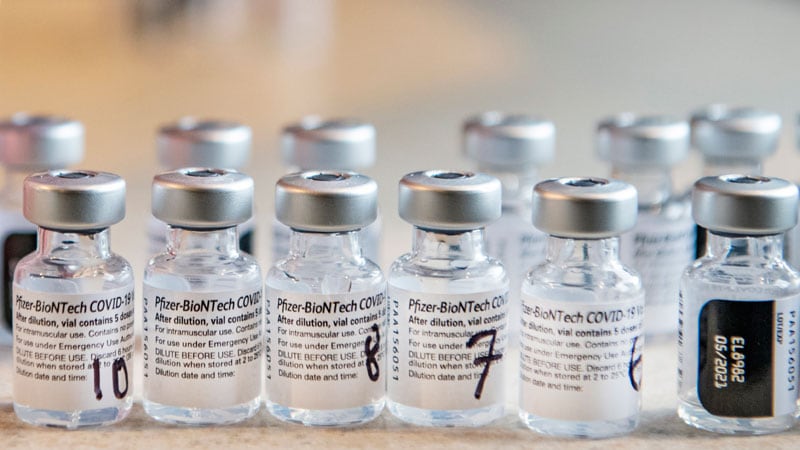
Editor's note: Find the latest COVID-19 news and guidance in Medscape's Coronavirus Resource Center.
Some states have started taking COVID-19 vaccine from allocations meant for long-term care facilities and offering it to the general public in order to more quickly vaccinate more residents, according to state health officials.
The federal Pharmacy Partnership for Long Term Care — which contracted with CVS, Walgreens, and Managed Health Associates to vaccinate nursing home residents and staff — based its allocation of vaccine doses on the number of beds, not the actual census, which resulted in an "overallocation," said Michael Fraser, CEO, Association of State and Territorial Health Officials (ASTHO), in a call with reporters on Thursday.
"In Maine we are not sitting around waiting for those doses to just get used on the timetable that retail pharmacies tell us," said Nirav Shah, MD, JD, president of ASTHO and director of the Maine Center for Disease Control and Prevention. "We're starting to withdraw those doses from the warehouses and move them into general circulation — either using independent pharmacies in our state or in some instances just giving them to hospitals and other sites.
"We're not letting those doses go to waste," he added.
Shah said about 75%-80% of Maine's nursing home beds were filled, which resulted in a 20% overallocation of vaccine. Those vaccine doses were initially required to be stockpiled even before the pharmacy partnership began vaccinating.
"We had to allocate it all up front and it sat idle for a long, long time," said Thomas Dobbs, MD, MPH, the state health officer for the Mississippi State Department of Health, on the call. He said that 22% of the state's overall vaccine allocation has gone to the long-term care partnership.
"If we think about the time value that we lost there by not having a more rolling inventory like the rest of our operations, we would have been in a lot better shape," said Dobbs.
Both Dobbs and Shah noted that the program was supposed to be completed within 6 weeks or so, but that it now appears that it will stretch many more weeks.
That means that "overallocation has been stretched for a longer-term period," said Shah.
"Suboptimal" Execution
The Centers for Disease Control and Prevention (CDC) reports that just over 4 million doses of vaccine have been administered in long-term care facilities. It is unclear how many have been allocated to the partnership.
CNN reported on February 3 that by its count, at least 266,675 doses in 10 states had been taken out of the long-term care partnership and put into general use.
While states are being criticized for not vaccinating people fast enough, ASTHO's Fraser said that "overall, what's really constraining our ability to vaccinate more folks in the country is not lack of sites or lack of plans but rather lack of vaccine itself."
"We do hear from states that they could vaccinate two to three times more people if they had the vaccine," he said.
As of February 4, 56 million vaccine doses had been distributed across the US, with 34 million administered. Some of the reasons for the gap include under-reporting by some healthcare providers, some states holding back supplies in anticipation of not having vaccine on hand for a second dose, and some inventory that has to be carried over at the end of the week to cover Monday or Tuesday appointments, since deliveries are generally on Tuesday or Wednesday, said Shah.
Some states are also making deliberate decisions to focus on lower-volume vaccination sites as those sites are generally in areas that serve the most vulnerable or difficult-to-reach populations, and that helps ensure equity, he added.
Both Shah and Dobbs acknowledged that vaccination sign-up has not been well-executed. "It has been suboptimal thus far," said Shah.
He noted that the CDC had created a national sign-up platform called VAMS, but that it has not been well-received by most states.
Mississippi has established a separate phone line for people over age 75, and some community groups are volunteering to secure appointments for older state residents. The state also has a call center and an online portal for individuals to sign up for appointments at the state's drive-through clinics. But demand is so high that when 30,000 appointments were made available for a first dose on February 3, they were gone in 4 hours, said Dobbs.
"The problem is vaccine supply," he said.
Alicia Ault is a Lutherville, Maryland-based freelance journalist whose work has appeared in publications including Smithsonian.com, the New York Times, and the Washington Post. You can find her on Twitter @aliciaault.
For more news, follow Medscape on Facebook, Twitter, Instagram, and YouTube.
"term" - Google News
February 05, 2021 at 05:41AM
https://ift.tt/3cVRhMD
States Shift COVID Vaccine From Long-Term Care to General Public - Medscape
"term" - Google News
https://ift.tt/35lXs52
https://ift.tt/2L1ho5r
Bagikan Berita Ini

















0 Response to "States Shift COVID Vaccine From Long-Term Care to General Public - Medscape"
Post a Comment